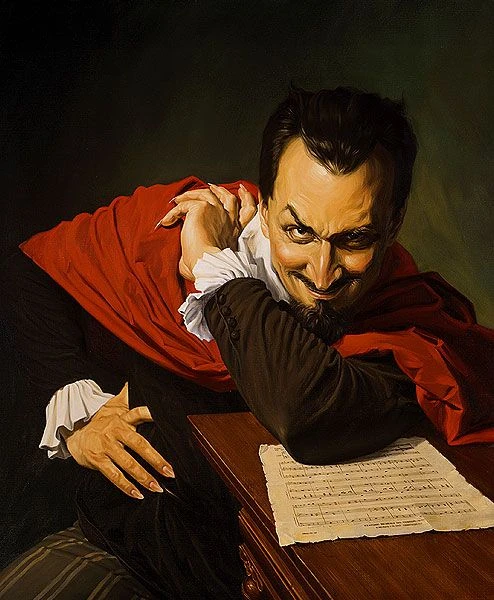“We fly, in hope to get his glorious soul.” (Mephostophilis)
To what extent do you agree with the view that “Mephostophilis is primarily responsible for Faustus’ damnation”?
By Oliver
The devil Mephistophilis is a central character in Marlowe's 'Doctor Faustus'. Throughout the play he fills the role of Faustus' servant, master and arguably even his companion. While it is clear that Mephistophilis does have a part in Faustus' downfall, is he primarily responsible for the damnation of the 'thrice-learned' scholar or do other factors play larger roles?
During the last act of the play Faustus himself blames Mephistophilis for his descent claiming that the devil has 'robbed (him) of eternal happiness' Mephistophilis does not argue against this but takes pride in how he 'damned up' Faustus' 'Passage'. Throughout the play we can see the way in which Mephistophilis cons Faustus into 'eternal damnation', through his use of rhetoric and distraction techniques. Mephistophilis plays to Faustus' greed and hubris, claiming that if Faustus gives away his soul he will be 'as great as lucifer', an ultimately hollow promise. Mephistophilis' asides in which he announces to the audience that he would do anything to 'obtain his (Faustus') soul, builds dramatic irony as the audience becomes aware of Mephistophilis' sly and cunning nature whilst Faustus is unaware, fixated on the riches the contract will bring. Distraction is also an important aspect of Mephistophilis' manipulation, at many points in the play Faustus doubts his decision to sell his soul and debates on turning to God once again however when this happens Mephistophilis fetches Faustus 'somewhat to delight his mind' and uses dramatic shows of grandeur such as the seven deadly sins pageants which, although superficial and essentially meaningless, placate Faustus' rebellions against the Devil.
Literary Critic Michael Mangan also explores the connection between Mephistophilis and Kelly, the assistant of the alchemist, mathematician and scholar Doctor Dee. Although it is unclear whether Marlowe and Dee ever actually met, they undoubtedly belonged to the same social circles and it's unlike that they wouldn't have known of one another. The renowned Doctor Dee became obsessed with 'the spirit world' paralleling Faustus' own obsessions with 'cursed necromancy'. Like Faustus this infatuation with the supernatural sent him into a spiral of 'practicing more than heavenly power permits' which eventually led to his arrest. Mangan however, does not just draw parallels between Faustus and Dee but also between the assistant Kelly and Mephistophilis. Kelly was known for being a 'charlatan' and 'confidence-trickster' (Mangan) and many historians believe that through his fake mediums he managed to swindle a fortune from Dee. This mirrors the relationship between Faustus and Mephistophilis where through playing on Faustus' insatiable appetite for knowledge, Mephistophilis manages to gain the most valuable fortune of all Faustus' 'glorious soul'. This confused relationship between master and servant is reflected through Mephistophilis use of possessive pronouns, although Faustus believes that he is Mephistophilis 'master', the possessive 'my' pronouns that Mephistophilis uses shows that he is the one who really is in control.
A Calvinist reading of the play would suggest that Mephistophilis' temptation only plays a miniscule part in Faustus' downfall, they would suggest that Faustus' damnation was predetermined and Mephistophilis is only an agent whose Job is to bring about God's will, Calvinism was a highly debated topic in the 1580s and Marlowe would have been exposed to both sides of the arguments whilst attending Cambridge the effects of which can be seen in his writing. Calvinism argues that God has already elected those who will be sent to hell and those who will be saved. A Calvinist would argue that due to predestination Faustus is doomed from the beginning. Even in the prologue of the play Faustus' fate is shown to us, before the play even begins the audience already knows that Faustus will fall into 'devilish exercise'. Mephistophilis even states that he 'turned the leaves // and led thine eye' when Faustus picked up the bible whilst deciding which course of further study he intended to pursue. Essentially, Faustus never had any free will, he was 'manipulated like a puppet' by Mephistophilis who is simply fulfilling God's orders.
A renaissance interpretation would argue against both the view that Faustus' descent was predetermined and the idea that Mephistophilis was primarily responsible for it. During the Elizabethan era Renaissance ideals were gaining traction with more and more people subscribing to the belief that through celebrating Human beauty and freewill they were celebrating God. Quickly Man became Man's own God. A renaissance audience would place sole responsibility of Faustus' damnation on Faustus himself. Throughout the play Faustus is warned of what will happen to him if he does not 'repent'. Characters such as the good angel never gives up on trying to redeem Faustus. despite the numerous times Faustus denounces God and bids 'divinity adieu' the good angel repeats that if only Faustus 'repents' then 'God will pity' him and he will be saved. In conclusion it is not Mephistophilis' deception, but Faustus' own decisions fueled by hubris and greed and an insatiable appetite for power that damns him.

Comments
Post a Comment